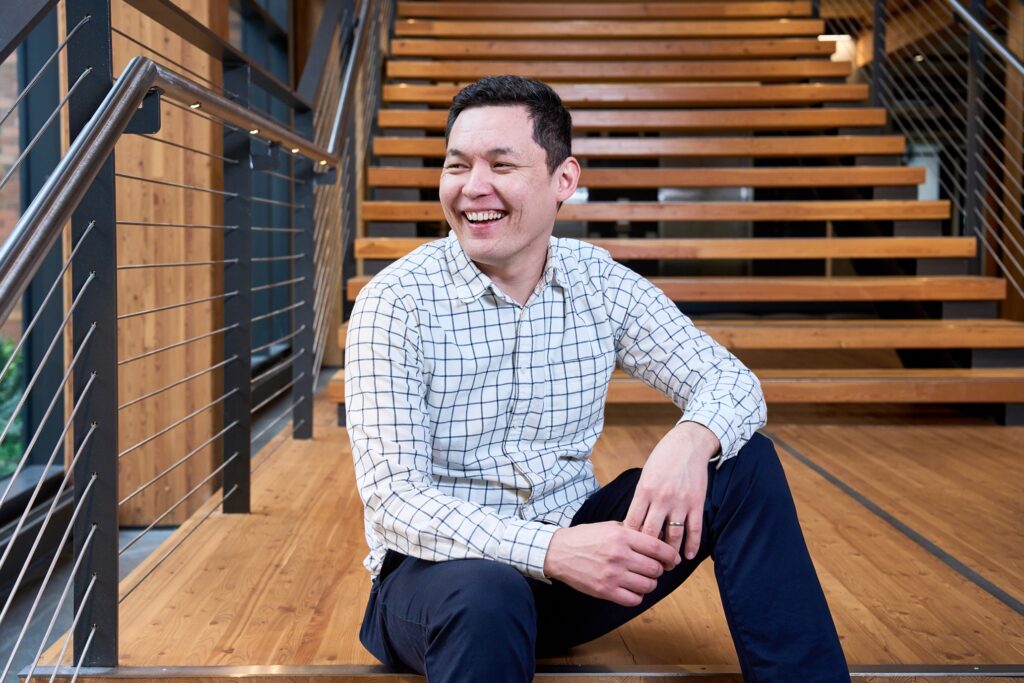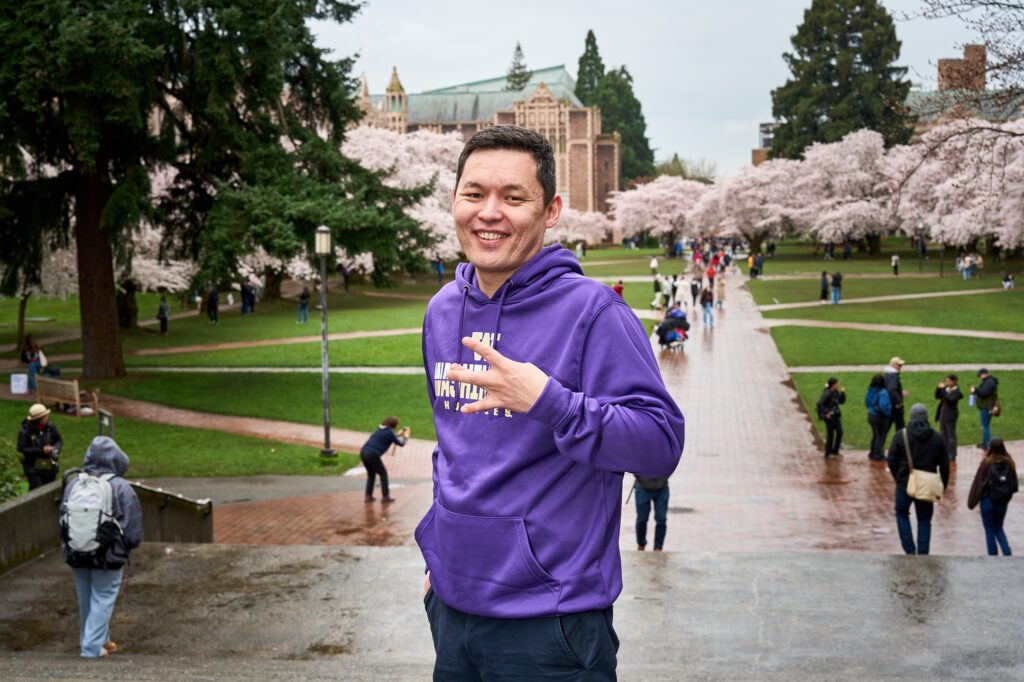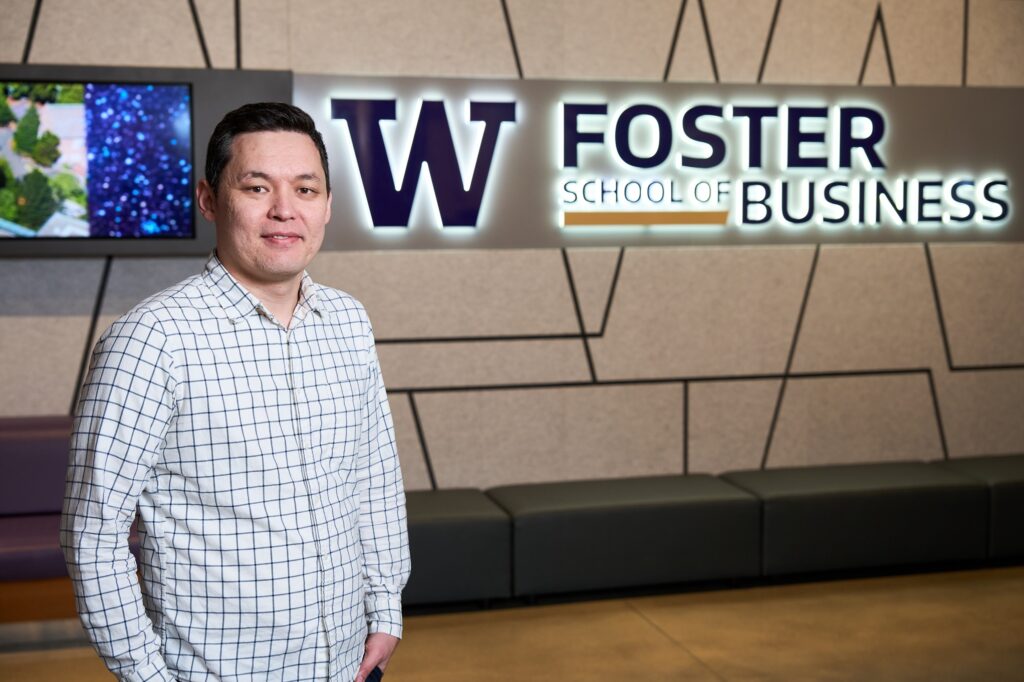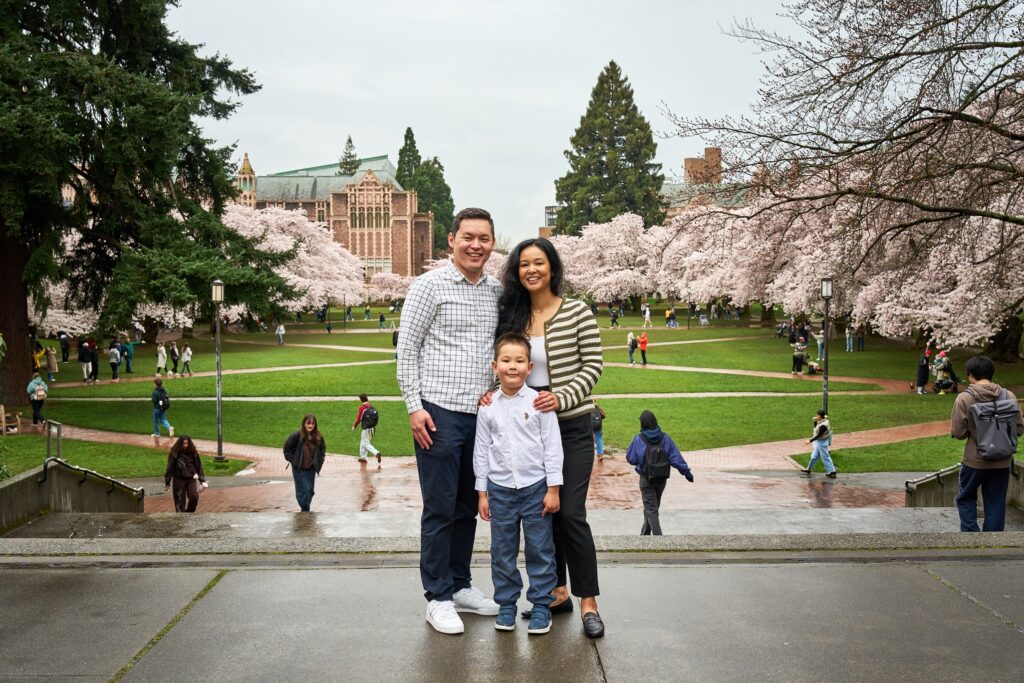The Career Accelerator That Changed Everything
Chingiz Torobekov was a successful entrepreneur who wanted global business expertise. Foster’s Global Executive MBA delivered.
When Chingiz Torobekov (MBA 2024) reached a turning point in his career, he had a choice: keep growing his food delivery company in Kyrgyzstan or expand his ambitions, travel across the globe, and gain the skills to take his career to the next level. Torobekov took the leap, enrolling in the 1-year Global Executive MBA at the University of Washington Foster School of Business.
That decision opened doors he never imagined, including a role at Amazon. Torobekov recently joined Amazon’s Gift Card Team as a senior program manager, focusing on strategic programs that impact Amazon’s global gift card experience.
A career pivot to international business
As an experienced entrepreneur, Torobekov considered pursuing an MBA for several years before applying to Foster. “I had built a successful food delivery business but realized that to grow as a leader, I needed to broaden my knowledge, expand my network, and gain a broader perspective on business,” he explains.
While researching programs, Foster’s Global Executive MBA caught his attention due to its accelerated one-year format, strategic location in Seattle’s tech hub, strong emphasis on leadership development, and access to STEM analytics electives. However, for Torobekov, there was another reason it felt like the right fit.
“I came to the U.S. for a year in high school as an exchange student and stayed with a host family in Boise, Idaho,” he shares. “My host family parents were University of Washington alumni, and they got me all the merch. Even though I was in Idaho, I proudly represented the University of Washington. I wore purple and gold, followed the teams, and admired the university. The first thing I did after being accepted into Foster’s Global Executive MBA program was message my host sister to tell her the news. It felt like coming home.”

From startup success to the classroom
As a business owner, Torobekov knew how to run a smaller company. But, he wanted to scale his impact. The Global Executive MBA curriculum gave him the insights, connections, and hands-on experience to do just that.
After graduating in 2024, he decided to stay within the tech industry and joined Viata.ai, a startup that uses AI-powered mapping technology to help businesses and travelers visualize and optimize the accommodation selection process.
“This startup opportunity intrigued me. They didn’t have a business model when I joined. Now they’re working with clients, helping travelers book hotels, and visualizing points of interest and travel times for people planning trips and longer-term stays, specifically targeting conferences and events.”
He served as Chief Product Officer, applying lessons from the Global Executive MBA program daily. “The program gave me the tools to approach decision-making with data and structure. Now, I can present ideas with clear, data-driven reasoning, which has been a game-changer in shaping strategy and business development.”
He sees the startup as the kickstarter, which has led to his Amazon role. “The tech startup experience has been invaluable.”

Global Executive MBA London immersion makes a lasting impression
The Global Executive MBA program’s focus on data analytics and economics made an immediate impact on Torobekov. “The consumer analytics coursework was fantastic. It blew my mind how small changes in consumption rates can affect revenues and profits. Alexis León’s classes (Micro and Macro) were also among my favorites—he connected everything with real-life examples.”
While analytics played a major role in shaping his ideas, one experience truly changed everything for him: the program’s sustainability immersion trip to London, England.
During the week-long trip, students learned from experts at Imperial College London’s Grantham Research Institute on Climate Change & the Environment. They also gained insights from leadership at BlackRock, Goldman Sachs, Impax Asset Management, Mazars, and Futerra about integrating sustainability into business strategy. This immersion opened his eyes and completely redefined how he viewed sustainability.
“Before this immersion trip, I thought sustainability was just another trending term,” he shared with a smile. “But in London, we got to go behind the scenes at companies that had woven sustainability into their core strategies. They were optimizing their supply chains, investing in energy-efficient technologies, and designing innovative products. It struck me that sustainability isn’t just about doing the right thing; it also offers a significant competitive business advantage.”
Torobekov applied this mindset at Viata.ai. “Now, when working on new products, the team considers questions like: ‘How can this improve long-term efficiency? What resources will it impact?’ The immersion experience genuinely transformed how I approach business decisions.”

Partnering with PACCAR and the Seattle Mariners
During the program, Torobekov also had the opportunity to work on projects that helped him bring his newfound knowledge to life. Teaming up with PACCAR, he and his team developed a playbook to help underserved communities apply for government grants, support the transition of duty trucks from diesel to electric, and improve EV infrastructure development.
But the project he loved most was with the Seattle Mariners baseball team. “This initiative was so focused on analytics,” he recalls. “We took a close look at fan behavior and created detailed customer personas. We helped to develop a data-driven segmentation model that connects the existing customer base to previously identified customer personas, enabling tailored messaging strategies to boost game attendance. The hands-on experience gave me incredible insights into how analytics can drive business strategies, and seeing our ideas come to life was just so rewarding. It was also a fascinating experience to see the inner workings of a Major League Baseball team.”
Torobekov’s group of students developed marketing strategies for the Mariners. “We found that getting more people to attend games isn’t just about selling tickets; it’s about enhancing the overall game-day experience, targeting specific preferences, and building strong connections with fans. By reaching out to the right folks with tailored messaging about customized experiences, we could really boost attendance and deepen the team’s relationship with its loyal fans.”

Making new connections in Seattle
Despite the program’s fast pace, Torobekov found time to build a strong sense of community within his Global Executive MBA cohort. “Our class size was small, and we built a robust support system. We organized great gatherings and cultural celebrations, such as Diwali, where we learned about different perspectives and worldviews. The global aspect was incredible—we had students from Peru, Singapore, Chile, South Korea, the U.S., Japan, India, Indonesia, and more countries. Each person brought impressive experience, and we learned from each other.”
Seattle also became home for his family. “We moved here together, and experiencing this journey as a family made it even more meaningful,” he shares. His son attends the UW-affiliated Experimental Education Unit (EEU) School at the Haring Center for Inclusive Education, where he is thriving. “He’s learning to appreciate and support others in a remarkable way for a kindergartener. He used to only speak Russian, and now he likes to brag that his English is better than mine. He even teaches his grandparents!”
The lasting value of an MBA
For Torobekov, the Foster School of Business Global Executive MBA was about acquiring new skills and refining the ones he already had.
He emphasizes that his MBA experience has opened doors he never expected. “Foster has unlocked opportunities for me in business. The program expanded my perspective, strengthened my leadership skills, and gave me the confidence and knowledge to pursue a more strategic, high-impact role on the global stage.”
Learn more about the Global Executive MBA here.
